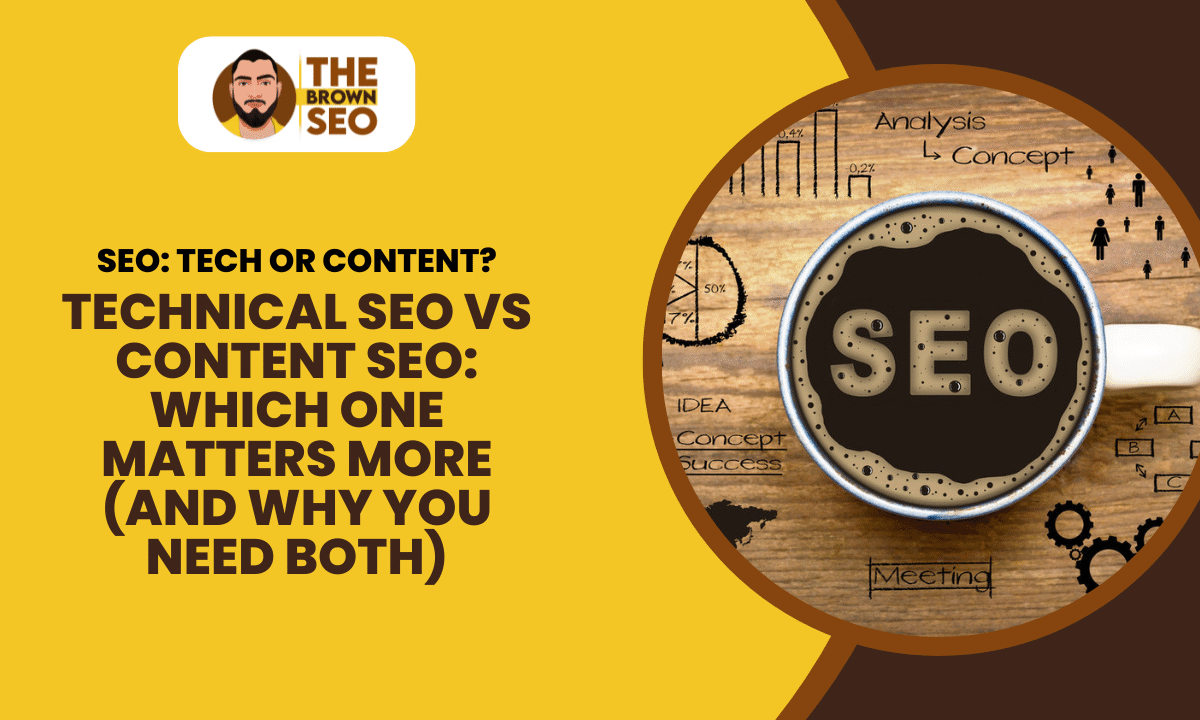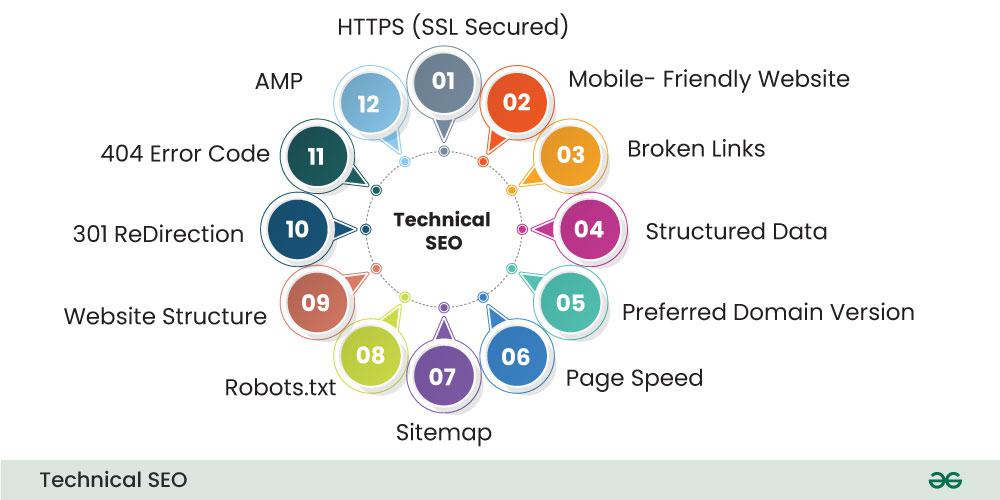
In the world of search engine optimization, there’s an ongoing debate that often trips up beginners and even seasoned marketers: technical SEO vs content SEO—which is more important?
The truth? They’re two sides of the same coin.
If you think you can climb Google’s ranks with just optimized content and ignore your website’s backend setup—you’re setting yourself up for failure. And vice versa.
This guide will break down everything you need to know about technical SEO vs content SEO, including key differences, real-life use cases, beginner-to-expert strategies, and how to master both for long-term results.
Why You Need to Understand This Comparison?
Many websites struggle with one of two problems:
- They produce amazing content, but no one sees it because the website is slow, has crawl issues, or isn’t mobile-friendly.
- Or, they have technically perfect sites, but the content is thin, unoptimized, and fails to rank or convert.
Understanding technical SEO vs content SEO helps you diagnose why your SEO efforts aren’t working—and what to do about it.
What Is Technical SEO?
Technical SEO is all about helping search engines access, crawl, interpret, and index your website efficiently. It forms the foundation of your site’s SEO success.
Key Technical SEO Factors:
| Element | Why It Matters |
| Site Speed | Google prefers fast websites; slow sites = lost rankings. |
| Mobile Optimization | Google uses mobile-first indexing—your mobile experience is critical. |
| HTTPS Security | Secures your site and builds trust with Google. |
| Crawlability & Indexing | XML sitemaps, robots.txt, canonical tags, and crawl error fixes. |
| Structured Data (Schema) | Enhances search appearance (rich snippets, FAQs, ratings). |
| Site Architecture | Clean navigation helps both users and crawlers find content. |
Example: If your product page isn’t indexed because of an incorrect robots.txt rule, no amount of content will help it rank. That’s why technical SEO is crucial.

What Is Content SEO?
Content SEO is about creating and optimizing valuable, targeted, and user-focused content that ranks well on search engines and satisfies user intent.
Key Content SEO Factors:
| Element | Why It Matters |
| Keyword Research | Helps identify what your audience is searching for. |
| On-Page Optimization | Title tags, meta descriptions, H1-H6 structure, keyword placement. |
| Content Quality & Depth | Google favors in-depth, useful content that solves real problems. |
| Internal Linking | Distributes link equity and helps crawlers discover related content. |
| Content Format & UX | Readability, visual hierarchy, media use, and engagement factors. |
Example: You write a blog on “best coffee makers 2025,” but it’s short, lacks key product details, and doesn’t use keywords effectively. Even with good technical SEO, it won’t rank well.
Technical SEO vs Content SEO: A Head-to-Head Breakdown
| Feature | Technical SEO | Content SEO |
| Focus | Website infrastructure | Quality of content and user value |
| Goal | Ensure crawlability and indexing | Rank for keywords and satisfy searcher intent |
| Requires | Web dev, HTML, server skills | Writing, keyword research, content strategy |
| Involves | Sitemaps, schema, speed, robots.txt, mobile, SSL | Blog posts, product pages, landing page optimization |
| Tools | Google Search Console, Screaming Frog, GTMetrix | Ahrefs, SEMrush, Clearscope, Surfer SEO |
| Without it? | Search engines may never find or trust your site | Even if indexed, content won’t attract or engage users |
| Who does it? | SEO specialists, developers, technical consultants | Copywriters, content strategists, SEO writers |
How Technical and Content SEO Complement Each Other?
Think of SEO like a car:
- Technical SEO is the engine—it makes everything run smoothly.
- Content SEO is the fuel—it drives the message and destination.
When Both Work Together:
- Fast, mobile-optimized pages with structured data (Technical SEO) hosting keyword-optimized, valuable content (Content SEO) = 🚀 High rankings and satisfied users.
A real-world winning strategy means:
- Creating a robust site architecture (Technical)
- Building content clusters for authority (Content)
- Monitoring with SEO tools for crawl errors and ranking issues (Both)
Tools to Manage Technical SEO vs Content SEO
Here’s a stack you can use:
For Technical SEO:
- Google Search Console – crawl errors, index status
- Screaming Frog SEO Spider – site audits, broken links
- PageSpeed Insights – site speed optimization
- Schema Markup Generator – structured data implementation
For Content SEO:
- Ahrefs/SEMrush – keyword tracking, content gap analysis
- Surfer SEO – on-page content optimization
- Grammarly & Hemingway – readability checks
- Google NLP API – check how Google interprets your text
When to Prioritize One Over the Other?
You don’t always need to work on both equally—your site’s current health should guide your focus.
| Situation | What to Focus On |
| Brand new site setup | Technical SEO (architecture, crawlability) |
| Traffic but no rankings | Content SEO (optimize existing pages) |
| Rankings dropped after redesign | Technical SEO (check errors, redirects) |
| Great content but slow site | Technical SEO (speed, Core Web Vitals) |
| Crawled and indexed but no engagement | Content SEO (target intent, improve UX) |
Alternatives & Complementary SEO Types
While technical SEO vs content SEO forms the core of on-site optimization, don’t ignore:
- Off-page SEO: Backlinks, social signals, brand mentions
- Local SEO: GMB optimization, local citations
- User Experience (UX): Bounce rates, time-on-page
- Conversion Optimization (CRO): Turning traffic into leads/sales
A holistic strategy aligns technical health, content relevance, and user satisfaction.
Conclusion
There is no SEO without both technical and content SEO. One makes your site search engine friendly, and the other makes it audience friendly. Together, they drive rankings, traffic, and business growth.
To truly scale your SEO:
- Don’t just ask “technical SEO vs content SEO—what’s better?”
- Instead, ask “Where is my current weakness? What’s holding me back?”
Fix technical gaps, strengthen your content strategy, and track results consistently.
Because ranking isn’t just about visibility—it’s about delivering value through structure AND storytelling.
